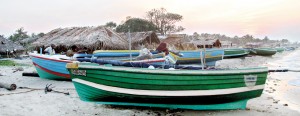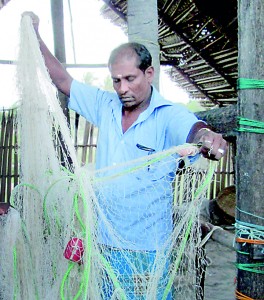News
There is no catch in it for our Northern fishermen
View(s):Its straightforward poaching by TN’s mechanised trawlers ravaging SL’s fishing grounds, driving Northern fishermen’s livelihoods into Davy Jones’s locker. Namini Wijedasa reports from Karainagar
The sun sets on a row of fishing boats idling on the shore in North-West Karainagar, Jaffna. Some, anchored in shallow waters, rise and fall with the swell of the sea. There will be no fishing tonight because it’s “turn naal”—or turn day.
This is how fishermen in Sri Lanka’s North refer to days on which Indian trawlers invade their seas. The word “turn” comes from an Indian internal arrangement, whereby, trawlers go out only on three days of the week, to allow their small fishermen an opportunity. But, on their turns, hundreds of mechanised boats surge into Sri Lankan waters, disrupting the livelihoods of fishermen here.

Boats lie idle on Karainagar beach to mark “turn naal”—or turn day.
This happens for ten months of the year on Mondays, Wednesdays and Saturdays. Sri Lanka’s fishermen— predominantly Tamils, impoverished by years of war and resultant fishing bans—go out to sea only when the trawlers stay away. Desperate for a solution, representatives of fishing societies pledged last week to launch a peaceful protest campaign, large enough and long enough, to grab wider international attention.
Meanwhile, the dispute is worsening. The Sunday Times visited the fishing village in North-West Karainagar on Monday. Two days later, on Wednesday, the Sri Lanka Navy (SLN) apprehended 19 Indian fishermen on four trawlers South of Mannar. The next morning, they caught 34 more on five trawlers. The arrests threw Tamil Nadu (TN) into a rage.
“There has been, in the last couple of weeks, a sudden change in the way Sri Lanka is handling the Indian fishermen issue,” said Fisheries Management Resource Centre (Fishmarc) Secretary, V. Vivekanandan in Trivandrum. He is also an advisor to the South Indian Federation of Fishermen Societies.
“It is not clear to us in India what is behind the sudden change of heart in Sri Lanka,” he mused. “The suspicion in India is that the timing of the action against the Indian fishermen appears sinisterly linked to the UN Human Rights Council Resolution. There is a belief that Sri Lanka is using the fishermen issue as leverage against India in this context.”
Similar sentiments are expressed in Colombo. Defence Secretary Gotabhaya Rajapaksa told a newspaper last week that, agitation over

A fisherman holds up a net damaged by Indian trawlers
TN fishermen—and particularly “false” claims that the SLN had shot at them—is part of an overall strategy to show Sri Lanka in a poor light at the ongoing UNHRC sessions.
Outbursts on Indian streets and in both Indian Houses of Parliament, forced External Affairs Minister Salman Khurshid to make a suo-moto statement on Thursday morning, and a second address the same evening. He revealed that the SLN had arrested 69 Indian fishermen between March 3 and 14, 2013. He also referred to a shooting incident, allegedly by the SLN, in which, an Indian fisherman was injured.
The Minister said, he shared the pain, anguish and concern of TN politicians. “And I can only say this to you,” he emphasised, “that I will do a little more than what I would have done for anybody else, and certainly, as far as the fishermen of TN are concerned, I will treat them as members of my family, to ensure that we give them the best possible attention, and ensure that they remain secure and safe.”
Last week, in Karainagar, Sri Lanka’s fishermen asked why their own Government didn’t feel, or do the same. In stark contrast to Indian protests, these men were despondent that their Navy wasn’t vigorous enough against poachers.
“Look at this,” said a middle-aged fisherman with bloodshot eyes, holding up a beautiful, red, fan-shaped coral. “And this,” he added, thrusting out a crusty, dried crayfish. “The Indian trawlers use equipment that scrapes everything off the seabed, including corals and other marine life. This coral has been snapped off. Our nets pass over the seabed and these things get caught in them.”
K. Rajachandran, the 53-year-old President of the Ambal Fishermen’s Cooperative, in Karainagar, nods in agreement. “About 150 trawlers come at a time, closer and closer to our coastline,” he said. “We are unable to go out. Sometimes it looks like a village out there.”
Their grievances and demands are familiar ones. Many fishermen were displaced multiple times during the war, and struggle to earn a living, to rebuild homes and to educate their children. Mr. Rajachandran himself shifted from Karanaigar to Jaffna town, to Chullipuram, to Chavakachcheri, to Kodikamam, back to Chullipuram, and onwards to Wanni, before returning to Karainagar.
They complain that their ocean is now seriously depleted. Indian trawlers suspend activity for 45 days each year to facilitate fish breeding. but return with more intensity when this interlude ends. Sometimes, local fishermen don’t have enough catch to sell even to self-employed motorcycle vendors. The trawlers are ravaging the seabed and destroying their nets. Despite sustaining colossal losses, they have nobody to claim damages from, and none to compensate them.
“We have appealed to politicians, to Ministers, to the President, to everyone,” said Mr. Rajachandran. “Nothing happens.” Hunger strikes and peaceful marches have been staged, to no avail.
Ironically, fishermen from the two countries have shared the Palk Bay for centuries. With large numbers of Sri Lanka’s fishermen fleeing to South India during the conflict, many families from either side, also know each other well. But fishermen had used methods and equipment that did not devastate the seabed, as South India’s multiplying fleet of trawlers do.
What used to be a small collection of mechanised boats, is now a massive “armada”, as one diplomat put it. This poses a challenge also to India’s own traditional fishermen. Sri Lankans are prohibited from trawling.
Fishermen’s societies from both countries have tried in the past, to resolve the dispute through dialogue. Several rounds of talks, in which Mr. Vivekanandan was also involved, resulted in a 2010 agreement that Indian fishermen would engage in trawling for a further 70 days and phase it out altogether.
Mr. Rajachandran was part of the team that reached this deal. “We have gone to India and Indian fishermen have come here for discussions,” he said. “But nothing happened with our agreement.”
Shortly afterwards, Sri Lanka decided that the dispute was one for the two Governments to solve, and it has now become a deeply politicised issue.
| Exclude politics from Indo-Lanka fishing issueThe India-Sri Lanka fishing issue is not just a political one, as it involves the livelihoods of thousands of fishing families, and hence, must be handled pragmatically, experts say. TN fishermen cannot be forced to stop trawling in Sri Lanka, overnight, observed Mr. Vivekanandan. Action must be taken in stages. The first step will require the TN government to send a clear signal to their fishermen, that it supports the end of trawling in Sri Lankan waters, he said. It will also necessitate a transition agreement between the two countries and fishermen, that TN trawlers will continue operations, but with much less freedom, and subject to various restrictions that protect Sri Lanka’s fishermen. During this period, the TN government would need to work out a package to reduce the trawl fleet through expert assistance and dialogue with fishermen. In the second stage, the TN government would have to implement the agreed package on trawl fleet reduction, and stop trawling by Indian vessels in Sri Lanka’s waters. It may also require that TN “traditional” fishermen also stop using mono-filament nets in Sri Lanka, which are also banned in Sri Lanka, Mr. Vivekanandan said. In both stages, enforcement will require support from the TN Fisheries Department, Indian Coast Guard and SLN. The third stage would be to work out a proper management of fish resources of the Palk Bay, that would be equitable and fair to fishermen of both countries, he explained. The starting point for any permanent solution, however, is for the TN government to acknowledge that it cannot expect its trawlers to have free reign in Sri Lanka’s waters. “This, unfortunately, is political and none of the political parties in TN understand the real fisheries issues,” Mr. Vivekanandan noted. “They are trapped in their own positions on Kachchativu, on the one hand, and the ethnic issue on the other. So change will not happen suo-moto.” Mr. Vivekanandan stressed that, for the necessary change to take place in TN government policies, TN fishermen themselves must seek change. “I have always believed that the fisheries issue can be resolved only if it is disentangled from the other political issues,” he concluded. |
Follow @timesonlinelk
comments powered by Disqus



















